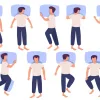How Does Bipolar Disorder Affect Individuals?
Bipolar disorder, also known as manic-depressive illness, is a mental health condition that affects millions of people worldwide. It is characterized by extreme shifts in mood, energy levels, and behavior. Individuals with bipolar disorder experience episodes of mania, where they feel overly excited, impulsive, and euphoric, as well as episodes of depression, where they feel extremely sad, hopeless, and lethargic. These mood swings can have a significant impact on various aspects of an individual’s life, including their relationships, work, and overall well-being. Let’s delve deeper into how bipolar disorder affects individuals:
- Emotional Rollercoaster: Bipolar disorder can cause intense emotional highs and lows. During manic episodes, individuals may feel invincible, have racing thoughts, engage in risky behavior, and exhibit increased energy levels. On the other hand, depressive episodes can lead to feelings of sadness, emptiness, and loss of interest in activities once enjoyed. These extreme mood swings can be disruptive and overwhelming.
- Disrupted Sleep Patterns: People with bipolar disorder often experience disturbances in their sleep patterns. During manic episodes, they may feel little need for sleep and may go for days with little to no sleep. Conversely, depressive episodes can result in excessive sleeping and a constant feeling of fatigue. These irregular sleep patterns can further exacerbate mood disturbances and impact daily functioning.
- Impaired Cognitive Functioning: Bipolar disorder can affect an individual’s cognitive abilities, including their memory, attention, and decision-making skills. During manic episodes, individuals may have racing thoughts, difficulty focusing, and poor judgment, which can lead to impulsive and reckless behavior. In contrast, depressive episodes can impair concentration, memory recall, and overall cognitive performance.
- Relationship Challenges: The erratic mood swings and unpredictable behavior associated with bipolar disorder can strain relationships with family, friends, and romantic partners. Loved ones may find it challenging to understand and cope with the sudden shifts in mood and behavior, leading to conflicts and feelings of frustration or helplessness.
- Work and Academic Difficulties: Maintaining a stable work or academic routine can be challenging for individuals with bipolar disorder. During manic episodes, they may take on too many tasks, exhibit poor judgment, and struggle with deadlines. In depressive episodes, they may lack the motivation and energy to perform their duties, leading to decreased productivity and potential job or academic performance issues.
- Substance Abuse: Individuals with bipolar disorder may turn to substance abuse as a way to cope with their emotional challenges. They may use drugs or alcohol to self-medicate or attempt to alleviate their symptoms temporarily. However, substance abuse can worsen the symptoms of bipolar disorder and lead to a vicious cycle of dependency and worsening mental health.
- Increased Suicide Risk: Bipolar disorder significantly increases the risk of suicidal thoughts and behaviors. The depressive episodes can be particularly severe, leading individuals to feel hopeless, isolated, and overwhelmed. It is crucial to seek professional help and support to manage these feelings and prevent self-harm.
- Impact on Physical Health: Bipolar disorder can also affect an individual’s physical health. The irregular sleep patterns, changes in appetite, and lack of self-care during depressive episodes can lead to weight fluctuations and compromised overall physical well-being. Additionally, the stress and emotional turmoil associated with the disorder can contribute to the development or exacerbation of physical health conditions.
- Financial Challenges: The impulsive and reckless behavior exhibited during manic episodes can result in financial difficulties for individuals with bipolar disorder. They may engage in excessive spending, gambling, or other risky financial decisions that can lead to debt and financial instability.
- Stigma and Social Isolation: Despite the growing awareness and understanding of mental health conditions, there is still a significant stigma surrounding bipolar disorder. This stigma can lead to social isolation, discrimination, and limited access to support and resources. Individuals may feel hesitant to seek help or disclose their condition due to fear of judgment and misunderstanding.
Bipolar disorder is a complex and challenging condition that requires proper diagnosis, treatment, and ongoing support. With the right combination of medication, therapy, and lifestyle adjustments, individuals with bipolar disorder can manage their symptoms effectively and lead fulfilling lives.
If you or someone you know is struggling with bipolar disorder or any other mental health condition, it is essential to seek professional help. Mental health professionals can provide an accurate diagnosis, develop a personalized treatment plan, and offer the necessary support to navigate the challenges associated with bipolar disorder.
Now that we have discussed how bipolar disorder affects individuals, it is crucial to prioritize mental health and well-being. Fitpaa, a leading health and fitness app, understands the importance of holistic well-being and offers comprehensive support to individuals seeking to improve their mental health alongside their physical fitness.
Fitpaa’s mission is to assist individuals in achieving their health and fitness goals. With its state-of-the-art technology and expert team of fitness coaches, nutritionists, and doctors, Fitpaa provides personalized guidance and support to help individuals optimize their metabolism and achieve their desired outcomes.
Fitpaa’s approach to mental health is rooted in the latest research in Lifestyle Medicine and Behavioral Therapy. By incorporating cognitive-behavioral techniques, Fitpaa’s Realtime Guidance technology helps individuals develop healthy habits, stay motivated, and take necessary actions to improve their well-being. The technology releases hormones such as endorphins, dopamine, serotonin, and oxytocin, which promote a positive mindset and overall mental wellness.
The Fitpaa app offers a multitude of features to support individuals on their mental health journey. From virtual workout trainers and diet trackers to performance tracking and progress monitoring, the app provides all the necessary tools to help individuals follow their customized Fitpaa Capsule effortlessly. Fitpaa’s expert team regularly reviews progress and makes adjustments as needed, ensuring that individuals receive the guidance and support required to achieve their health and fitness goals.
If you are ready to embark on a journey towards improved mental and physical well-being, download the Fitpaa app now. Fitpaa’s dedication to transforming lives and its commitment to offering guaranteed results make it a trusted partner in achieving your health and fitness goals. With a 7-day risk-free trial and a money-back guarantee, Fitpaa ensures that your satisfaction and well-being are prioritized.
Join the Fitpaa community today and experience the joy of taking charge of your mental health while working towards a healthier, happier life.









